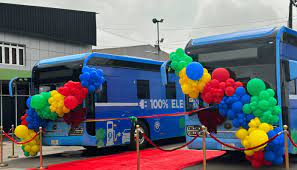National Centre for Technology Management (NACETEM) official, Dr Abubakar Kazeem, says emergence of electric vehicles (EVs), government efforts at reducing gasoline and subsidy removal are setting the environment for green cars.
Kazeem, Head, Department of Science Policy and Innovation Studies, NACETEM, in an interview with the News Agency of Nigeria (NAN) in Abuja, said implementation of Petroleum Industrial Act (PIA) was also included.
According to him, the automobile industry is revving up efforts to make cars more eco-friendly.
He disclosed that an exciting path that was being explored was the increased use of lightweight aluminum alloys which not only made cars lighter but also helped in reduction of harmful greenhouse gas emissions.
“The novel experimental X7475 aluminum alloy, a potential game changer in this pursuit, is where we should focus on now.
“What if we could make cars lighter without sacrificing safety or performance? That’s precisely the challenge that researchers are tackling with the X7475 alloy.
“This alloy is like a secret weapon against emissions, aimed at creating passenger cars that are friendly to the environment,’’ he said.
Kazeem, also NACETEM’s Assistant Director of Research and Adjunct lecturer at the Department of Mechanical Engineering, University of Abuja, noted that environmental preservation and sustainability with reduction in pollution was the target.
He explained that the X7475 was special because in the past, researchers looked into using aluminum for things like bumper beams and even recycling aluminum from beverage cans.
However, their focus wasn’t on transforming the familiar 3xxx alloy into a cutting-edge 7xxx alloy like X7475.
“It’s like taking something good and turning it into something even better, the laboratory experiment has reached advance stage.
“The X7475 alloy recipe involves a mix of elements; they played around with the percentages of zinc (Zn) and magnesium (Mg) while maintaining the right balance with manganese (Mn).
“These alloys went through various processes like heating and aging to see how they’d change. They were like artists mixing colors to get just the right shade,’’ he said.
The director said that at this point was where things started getting interesting when heat treatments created tiny structures within the alloy, making it stronger and more durable.
He stated that these structures, called hardening phases, were like reinforcements that made the alloy tough and resilient.
“After further analysis of the processes, he pointed out that X7475 wasn’t just a bunch of elements, but a symbol of innovation.
“By using recycled materials like beverage cans, researchers are showing us t hat eco-friendliness can go hand-in-hand with cutting-edge technology. It’s like breathing new life into something old,’’ he said.
He said that in spite of this, there was always rooms for improvement researchers suggested using advanced techniques like Design of Experiment (DOE) to fine-tune the alloy’s properties even more.
Conclusively, he said that the research unveiled a promising alloy with the potential to make cars lighter and more sustainable and that this wasn’t just science but a step towards a greener future.
“By turning recycled cans into high-performance alloys, researchers are rewriting the rules of the game.
“Its innovation with a purpose, shaping the future one alloy at a time. So, the next time you see a car whizz by, remember that the key to a greener planet might just lie in its alloyed heart,’’ Kazeem said. (NAN)

























